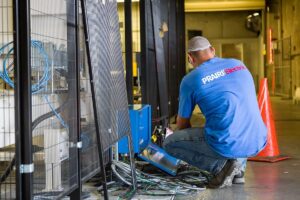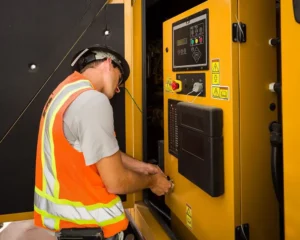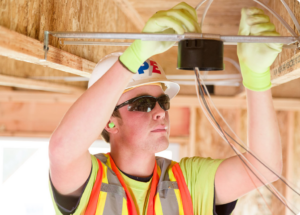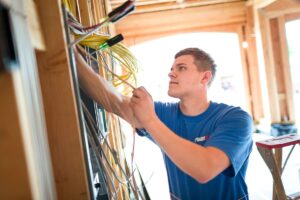Electricians play a crucial role in powering residential, commercial, and industrial environments. With specialized skills in electrical systems, wiring, troubleshooting, and installation, electricians are in high demand across many sectors. Here, we’ll break down the various types of jobs for electricians, with a strong focus on entry-level positions and how aspiring electricians can gain a foothold in this rewarding career.
Entry-Level Electrician Jobs: Building a Strong Foundation
For those just starting out, entry-level electrician jobs are designed to provide foundational skills and practical experience in a real-world setting. Typically, entry-level electricians are apprentices or trainees who work under the supervision of a licensed journeyman or master electrician. Here’s a look at some common entry-level roles:
1. Apprentice Electrician
Apprenticeship programs are the most common entry route for aspiring electricians. Apprentices gain hands-on experience by assisting journeymen with tasks such as basic wiring, installing outlets and light fixtures, and troubleshooting minor electrical issues. Apprentices also attend classroom instruction as part of their program, which typically lasts 3-5 years.
2. Residential Electrician Assistant
Residential assistants work alongside residential electricians, focusing on single-family homes, apartments, and small residential buildings. They help with tasks like wiring, repairing electrical systems, installing circuit breakers, and ensuring safety compliance in homes.
3. Construction Electrician Helper
This role is ideal for entry-level electricians interested in construction and renovation projects. Helpers assist experienced electricians in installing wiring systems in new buildings, setting up electrical panels, and ensuring the electrical system is safe and up to code before final inspection.
4. Electrical Maintenance Assistant
In larger facilities, electrical maintenance assistants work on upkeep and troubleshooting of the electrical systems under the guidance of maintenance electricians. Their tasks may include identifying and fixing minor electrical faults, replacing fuses, and checking circuit breakers. This role is common in hospitals, schools, and large retail buildings.
5. Electrical Installer
Entry-level electricians in installation roles may specialize in installing components for security systems, lighting, and low-voltage wiring. This type of work is often done in residential and commercial buildings, where electricians ensure these systems are properly connected and functional.

Residential Electrician Jobs
Residential electricians work on homes, apartments, and small residential buildings, handling everything from electrical repairs to major system upgrades. Some common residential electrician jobs include:
- Home Wiring for Remodels and Additions
Residential electricians frequently work on wiring for home remodels and additions, making sure new spaces are safely connected to the home’s electrical panel. This may involve installing new circuits, upgrading panels, or adding sub-panels to handle the increased load. - Home Safety Systems
Electricians often install safety systems in homes, including smoke detectors, security lighting, and surveillance equipment. These systems are especially important in ensuring the safety of families and homeowners. - Specialty Installations
With the rise in electric vehicles and other complex devices, residential electricians are frequently called upon to install EV chargers and advanced wiring. They also work on specialty installations like in-home theaters, hot tubs, and swimming pools, which require specific wiring expertise.
Commercial Electrician Jobs

Commercial electricians work on larger buildings and spaces like retail stores, offices, and restaurants, managing more complex electrical systems. Jobs in commercial settings typically involve:
- Lighting and Energy Management Systems
Commercial electricians often install and maintain energy-efficient lighting and control systems. These include LED lighting, occupancy sensors, and timed lighting controls, all of which help businesses save on energy costs. - Network and Data Cabling
Many commercial electricians specialize in installing data and network cabling, which is essential for setting up internet and phone networks within offices and retail spaces. - Electrical Wiring for Remodels and Upgrades
When businesses undergo renovations, commercial electricians handle the electrical aspects of remodeling, ensuring that new systems are compatible with existing wiring and meet code requirements. - EV Charging Stations
As the demand for electric vehicles grows, commercial electricians are often needed to install charging stations in business parking lots, particularly in offices, hotels, and shopping centers.
Industrial Electrician Jobs
Industrial electricians work in high-powered environments such as factories, manufacturing plants, and other industrial facilities. These roles require extensive technical knowledge due to the complexity of industrial systems. Some of the key jobs in this field include:
- Industrial Equipment and Machinery Maintenance
Industrial electricians maintain and repair specialized equipment and machinery. They work on everything from conveyor systems to robotics, ensuring that production lines operate without interruptions. - High-Voltage Systems and Controls
Industrial electricians are trained to work with high-voltage systems that power heavy-duty equipment. They install and repair transformers, high-voltage wiring, and electrical switchgear, and they ensure all connections meet safety standards.

- Programmable Logic Controllers (PLC) Programming
Many industrial environments use PLCs to automate machinery and control systems. Electricians with experience in PLC programming can work as automation specialists, troubleshooting and programming the controllers that keep automated systems running smoothly. - Specialized Facility Systems
Industrial electricians may also handle specialized systems like refrigeration, water treatment, and waste management systems within large facilities. These roles require a deep understanding of both electrical systems and facility management.
Diverse Career Paths for Electricians Across Industries
Beyond residential, commercial, and industrial roles, electricians can find work in a wide array of specialized industries:
Aerospace and Automotive
Electricians in aerospace and automotive industries work on wiring for vehicles, aircraft, and other specialized equipment. They often focus on ensuring safe and effective electrical systems in complex, high-stakes environments.
Medical and Telecommunications
Hospitals, labs, and telecom facilities rely heavily on electrical systems. Electricians here work on critical infrastructure, such as emergency power systems, telecom network setups, and specialized medical equipment.
Military and Government Projects
Military and government sites need skilled electricians for secure and often high-tech wiring installations. This includes everything from base infrastructure to communication and radar systems.
Agriculture and Biofuel
In the agriculture sector, electricians handle installations and maintenance of electrical equipment used in food processing, irrigation, and crop management. Biofuel plants require electricians for energy system installations and maintenance, focusing on both efficiency and sustainability.
Ready to Start Your Electrical Career?

Electricians have numerous career options in industries that rely on safe and efficient electrical systems. If you’re starting out, an entry-level job or apprenticeship can set you on the path to becoming a journeyman or even a master electrician, unlocking opportunities in residential, commercial, and industrial sectors.
Whether you’re just starting or have years of experience, the possibilities for electricians are vast and rewarding. Interested in learning more about a career in electrical work? Visit our Careers page for current job openings, training opportunities, and more information on how to start your career with Prairie Electric.


